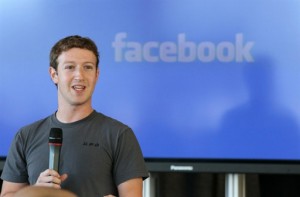Buffalo, New York — A man suing for part ownership of Facebook must give lawyers for the social networking company access to every email he has exchanged since 2003, a federal judge ruled Tuesday.
Judge Richard Arcara denied Paul Ceglia’s request to delay Facebook’s access to his emails so he could object on privacy grounds. It was the latest in a series of court rulings that have gone Facebook’s way as the Palo Alto, California-based company and its founder, Mark Zuckerberg, aggressively defend against Ceglia’s claims that Zuckerberg signed away half of Facebook before it got off the ground.
Lawyers for Facebook, estimated to be worth $50 billion or more, say the lawsuit is a fraud.
Tuesday’s ruling came after Ceglia’s lawyers sought to delay first all, then part, of an Aug. 18 order compelling him to produce, by this past Monday, additional materials and his email accounts on top of a raft of computers, disks and saved emails he’s already made available.
When a judge on Friday refused to stay the entire order, Ceglia sought Monday to protect just his email accounts.
“In today’s world, people commonly discuss their most private and important matters by email,” his attorney, Jeffrey Lake, wrote. “As such, allowing defendants’ experts to search though and read all of Ceglia’s emails since 2003 undoubtedly will give them a view of matters far outside the scope of this litigation and far inside Ceglia’s private life, a view to which no one is entitled and that is protected from government prying by the most sacred components of the Constitution.”
Facebook attorneys have accused Ceglia of seeking delays as a way to buy time to dispose or tamper with evidence. Their forensics experts said key Facebook-related files had recently been stored on portable devices attached to Ceglia’s computers but when Ceglia was told to produce them he said he’d lost them.
“Paul Ceglia brought a fraudulent lawsuit that is now crashing down around him,” Facebook attorney Orin Snyder wrote last week in objecting to Ceglia’s request for more time to comply with the latest court order.
Ceglia, of Wellsville, about 300 miles (500 kilometers) northwest of New York City, claims that when he hired Zuckerberg to help him develop a street-mapping database in 2003, he gave the then-Harvard University freshman $1,000 in start-up money for his fledgling Facebook idea with the condition he’d own half if it expanded. Ceglia said a work-for-hire contract he and Zuckerberg signed, followed by a series of email exchanges, proves his claims.
Facebook attorneys say that Zuckerberg did some work for Ceglia but charge that the contract Ceglia produced with his lawsuit has been altered to include references to Facebook and that the emails are made up entirely. They said their experts found a copy of the “authentic” contract, absent any reference to Facebook, embedded on Ceglia’s computers. Ink testing is under way on the hard-copy version Ceglia’s been storing in a safe-deposit box.
Facebook and Zuckerberg will soon move to dismiss the lawsuit based on “the now-overwhelming evidence that Ceglia appears to have destroyed critical electronic documents and is perpetrating a large-scale fraud,” Snyder, of Gibson, Dunn & Crutcher LLP in New York, wrote in last week’s filing.
Lake, based in San Diego, did not respond to a request for comment Tuesday. Ceglia has been staying in Ireland and has not responded to The Associated Press’s repeated requests, through past and present lawyers, for interviews.
